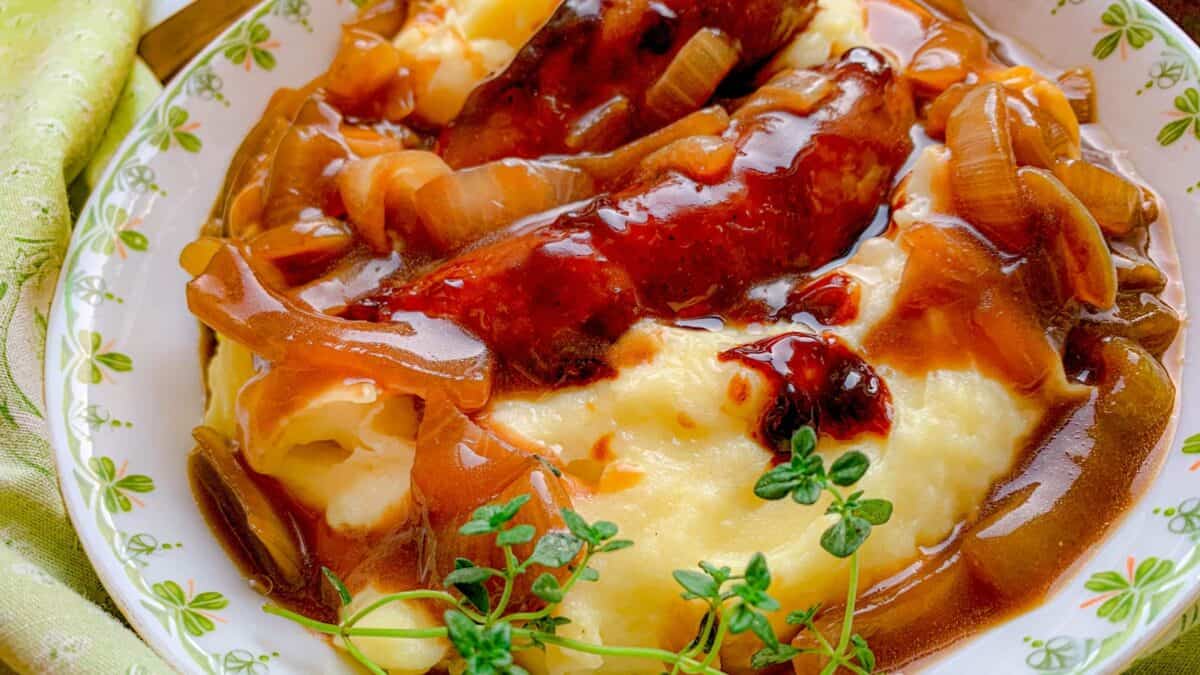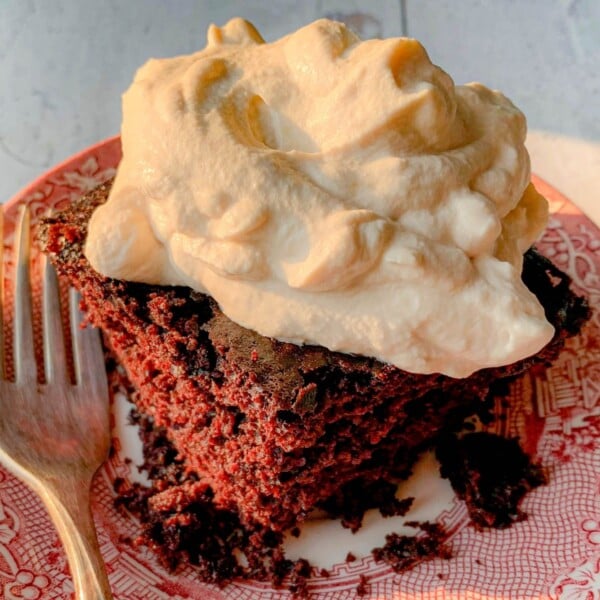This post may contain affiliate links, please see our privacy policy + disclosures for details.
Bangers & Mash with Guinness Gravy is pub fare fit for a St. Patrick’s Day celebration or whenever the comfort food notion strikes! War-time meat stretching led to “bangers” earning their explosive moniker from the “bang” they make while cooking, thanks to the cheeky addition of rusk!
If you love Irish pub food, you won’t want to miss these recipes for Irish cottage pie and Irish soda bread with raisins and caraway.

Introduction
I remember eating a version of bangers and mash as a child at my Grandma DeRemer’s house—though I only liked the mashed potatoes. As it turns out, her grandmother was from Ireland and made this dish weekly for the family.
Over the years, bangers and mash slowly grew on me, and some of the best I’ve had were in Montreal, Canada, where nearly 49% of the population is Irish. If you ever find yourself there on St. Patrick’s Day, prepare for one of the best celebrations of your life. This recipe will show you the method for cooking fork-tender bangers that I learned from my Irish-Canadian friend.
This hearty pub classic features juicy sausages served on top of creamy mashed potatoes, then smothered in a rich Guinness-onion gravy that’s also delicious on pork chops. Simple to make and deeply satisfying, it’s the kind of dish that brings cozy pub vibes right to your kitchen.
Ingredients

Wondering what ingredients you’ll need for these Irish bangers and mash with Guinness gravy? Let me tell you about the most important ingredients you’ll need!
- Bangers: Irish pork sausages that include rusk (a bread filler) is the very best and authentic option. (I found some at Trader Joe’s!) But use any good quality pork sausage if you can’t find bangers.
- Guinness Stout: For best results, I use Guinness. Use any ale, lager, or stout that you drink and love because the poaching liquid becomes the flavor profile. However, lite beer will not work.
- Russet Potatoes: This type of potato is versatile and makes beautiful mash. If you don’t have russets on hand, Yukon Gold will also work very well.
- Yellow Onions: These will add a wonderful depth of flavor to the gravy, along with the bangers and stout.
See recipe card for full information on ingredients and quantities.
How to Make Irish Bangers and Mash with Guinness Gravy
- Brown the Bangers: Poach the sausages in the stout over medium heat with the lid cracked slightly for about 10 minutes, turning halfway through. Remove the lid and allow the liquid to reduce a bit and coat the sausages. When the liquid is almost gone, lower the heat to medium low and cover, rotating the sausages occasionally, until they’re evenly browned and cooked through, about another 10 minutes.
- Make the Guinness Onion Gravy: In a separate deep skillet, melt the butter and cook the sliced onions until they’re lightly golden and fragrant, about 20 minutes. Add the thyme and stir for a minute, then sprinkle in the flour and cook for 2-3 minutes. Slowly pour in some stout and scrape the bottom of pan vigorously to loosen all the flavorful brown bits. Add the Worcestershire sauce and beef broth, and simmer until it’s thickened and no longer foamy.
- Make the Buttermilk Mash: Boil the cubed potatoes in salted water until they’re fork tender, then drain them and put them back in the pot. While the potatoes are cooking, melt some butter in a saucepan along with buttermilk, salt and pepper. Combine the buttermilk mixture with the potatoes and use a handheld potato masher to mash and cream the potatoes.
- Serving the Bangers and Mash: Assemble heaps of potatoes in several wide shallow bowls. Ladle generously with the Guinness stout onion gravy and top with two or three bangers. Enjoy with a pint and wedges of warm Irish soda bread!
Recipe FAQs
The term “banger” originated in early 20th-century Britain during wartime meat shortages, when sausages were bulked up with inexpensive fillers like rusk (hard, dry twice-baked bread). These high-moisture sausages often burst out of their casings when cooked, giving rise to the nickname “bangers”.
While all bangers are sausages, not all sausages are bangers. Bangers must have a filler, preferably rusk, to be authentic. You can often find them at your local butcher shop or pre-packaged at stores like Trader Joe’s, especially around St. Patrick’s Day.
As a general rule of thumb, use traditional pork sausage–preferably some great butcher-made ones if you can. I like using something on the scale from a zippy Cumberland link to say a sage-spiked Lincolnshire variety.
If you prefer something other than pork, use any sausage you like. I have seen recipes where even Bratwurst sausages were specified. I’ve also seen this dish served with butcher-made beef sausages, however, have yet to sample in this method.
Russet potatoes are my favorite; I use them for all potato recipes unless the recipe specifies a different variety, as they stand up to anything! A large pot of salted water and large chunks of peeled russets are all you need for the beginnings of a good mash.
I use an old-fashioned potato masher to ‘mostly’ mash all of the potatoes. Heated buttermilk with a tablespoon of butter or three, and some salt and black pepper, and I’m there. Basic. Simple. No fuss. Pub grub at its finest.
For best results, I use Guinness. Use what you drink and love because the poaching liquid becomes the flavor profile. You don’t have to use Guinness; but a stout, porter, or other dark beer is necessary to achieve the deep sweet malty flavor profile we are going for with the onion gravy.
No other beer with the exception of maybe a red ale (Irish red or Flanders red) can ‘level up’ the profile in the caramelization process.
Before you get happy, that lite beer isn’t going to cut it. You will need an ale, a lager or a stout, anything that contains fermentation sugars so the science will work properly, but not lite beer.
Serving Irish Bangers and Mash with Guinness Gravy
I highly recommend serving this bangers and mash with a slice of Irish soda bread with raisins and caraway! Although this meal is hearty enough to stand up on its own, it would be lovely to accompany this with a refreshing salad, like this marinated fresh fig and mozzarella salad or this curly endive salad. Round out your meal with a tasty dessert, like Guinness beer cake, Bailey’s Irish Cream cupcakes, or this Irish custard with pear crumble.

Expert Tips
- Try to use authentic bangers that include rusk if you can find them (I bought mine at Trader Joe’s). Otherwise, use good-quality pork sausages.
- Use Guinness or any ale, lager, or stout to poach the sausages. The beer will evaporate, and the sugars will caramelize, leaving a thick, dark, and flavorful syrup coating the sausage. This will add an amazing flavor to the gravy!
- If you don’t have russet potatoes on hand, Yukon Gold is a good substitute. Either of these types will make wonderful mash!
Other Irish Recipes You’ll Love
If you liked this recipe and found it helpful, give it some love by sharing!
Follow me on Pinterest and Flipboard for more crave-worthy recipes!
The pleasure of a 5-star review would be greatly appreciated!

Bangers and Mash with Guinness Gravy
Equipment
Ingredients
For the Bangers
- 1 pound bangers, or good quality pork sausage
- 1 tablespoon olive oil
- 6 ounces Guinness stout
For the Stout Onion Gravy
- 2 tablespoons unsalted butter
- 2 large yellow onions, thinly sliced
- 2 tablespoons fresh thyme leaves
- 2 tablespoons all-purpose flour
- 1 cup Guinness stout
- 1 tablespoon Worcestershire sauce
- 1 cup beef broth, or chicken broth
- ¼ teaspoon kosher salt
- ⅛ teaspoon black pepper
For the Buttermilk Mash
- 4 large russet potatoes, peeled and cut into 1 1/2-inch chunks
- 1 tablespoon kosher salt
- ½ cup buttermilk, warmed
- 3 tablespoons unsalted butter
Instructions
Cooking the Bangers
- Add the olive oil to a large cast iron skillet set over medium-high heat. When the oil begins to shimmer, carefully add the sausages and slowly pour in the stout. Reduce the heat slightly and place the lid on askew to allow some steam to escape. Cook the sausages and stout covered for about 10 minutes, turning halfway through.
- Uncover and allow the liquid to reduce a bit and coat the sausages. When the liquid is almost gone, lower heat to low, cover and cook, rotating occasionally, until the sausages are evenly browned and cooked through, about another 10 minutes. Sausages will begin to glaze and become dark and shiny.
Making the Stout Onion Gravy
- In a separate deep skillet, melt the butter over medium high heat. Add the sliced yellow onions and reduce the heat to medium low. Cook until lightly golden and very fragrant, about 20 minutes. Add the fresh thyme leaves and stir for a minute until the thyme becomes aromatic.
- Sprinkle flour over top the onion mixture and allow to cook for 2-3 minutes. Slowly pour in stout and scrape the bottom of pan to deglaze and loosen brown bits. Add Worcestershire sauce and beef broth, stir, and allow to simmer until no longer foamy, about 15 minutes. Stout onion gravy will thicken upon standing.
Making the Buttermilk Mash
- Fill a large pot with water and the kosher salt. Add prepared potatoes and bring to a boil. Cook potatoes until they are fork tender, then drain them well and add them back to the pot. Place the pot on the still-hot burner and shake the pan to encourage the potatoes to dry out further.
- While potatoes cook, melt butter in a saucepan along with buttermilk, salt and pepper. You only need to heat the buttermilk enough to warm it.
- Combine the buttermilk with the potatoes and use a handheld potato masher to mash and cream the potatoes. Leaving a few chunks here and there is fine.
- Assemble a heap of potatoes in several wide shallow bowls. Ladle generously with the Guinness stout onion gravy and top with two or three bangers. Enjoy with a pint and wedges of warm Irish soda bread!
Notes
- Try to use authentic bangers that include rusk if you can find them (I bought mine at Trader Joe’s). Otherwise, use good-quality pork sausages.
- Use Guinness or any ale, lager, or stout to poach the sausages. The beer will evaporate, and the sugars will caramelize, leaving a thick, dark, and flavorful syrup coating the sausage. This will add an amazing flavor to the gravy!
- If you don’t have russet potatoes on hand, Yukon Gold is a good substitute. Either of these types will make wonderful mash!
Nutrition
Nutrition information is automatically calculated, so should only be used as an approximation.















Thanks for sharing at the what’s for dinner party. Hope you’re having a great weekend.